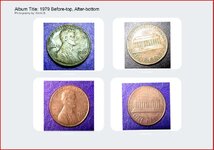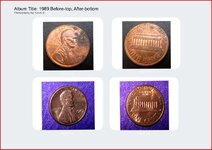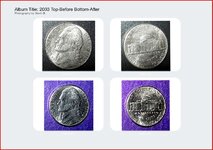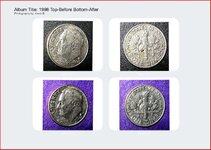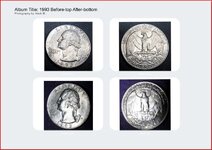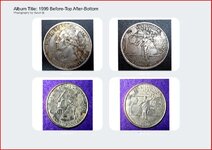Massbaycolonist
Full Member
This is the test results achieved using Charles Garrett's cleaning recomendation. First, a description of the experiment is presented. This is followed by an evaluation of the results achieved with each coin. Lastly, there is a conclusion statement regarding the efficiency of the test. Before and After photos of each coin are also presented.
EXPERIMENTAL METHODOLOGY
Following are the results of coin cleaning tests using Charles Garrett's coin cleaning method described in his booklet, The Sport of Coin Hunting with a Metal Detector.
Six modern U.S. circulated coins were selected for the test:
1979 penny
1989 penny
2003 nickel
1998 dime
1993 quarter
1999 state quarter
Before photos were taken of each coin prior to washing.
One ounce of white vinegar was mixed with one teaspoon of table salt in a small glass bowl.
The 2003 nickel was soaked in this solution for approximately one half hour.
After soaking for about half an hour, the coin was then removed from the solution. The coin was then rubbed with a clean, dry cotton Q tip swab to dislodge residuals.
Then the coin was rinsed under cold running water for about two minutes.
The coin was placed on a paper towel, and blotted dry. This was the proceedure used for each coin upon removal from the solution.
The 1998 dime was then placed into the wash solution for approximately one half hour before removal.
The two quarters were then placed together in the solution, and left overnight, and removed the following morning.
The next day, a fresh bowl of solution was made using the same recipe.
Into this solution was placed the 1998 dime. The dime was soaked for approximately one half hour before removal.
Then both pennies were placed into the wash, and left for several hours before removal.
The cleaned coins were then lightly buffed with a clean, dry cotton Q tip swab.
After photos were taken of each cleaned coin.
The RESULTS
1979 penny: This coin was washed quite clean, but not a hint of the coins original lustre was restored.
1989 penny: This is a damaged coin. The upper right hand quarter of the face side has been chipped or stripped of its cover layer. This fact is not readily observable in the photos.
This coin was washed very well. Some of the coins original lustre was also restored. For these pennies with a grade of Fair or higher, it is probable that the cleaning results willl be very good.
The 2003 nickel: This coin was cleaned very well, with some original lustre restored.
The 1998 dime: This coin was cleaned very well, with some original lustre restored.
The 1993 quarter: This coin was well washed.
The 1999 state quarter: This is a damaged coin. The obverse side has been oxidized, leaving a cloudy or hazy finish. This coin was not well washed. This coin showed the most resistance to the cleaning solution/process.
CONCLUSION
This method of washing coins is very good for these types of coins in these date ranges. The coins become clean and attractive, and allow for proper grading. At the same time, enough dirt and tarnish is left on the coin to make the numismatist and dealer happy.
The 1979 penny and the 1999 state quarter had the worst results after washing. Some coins, especially with Poor grade and damaged coins will not clean up well using this proceedure. Overall, this is an excellent low impact method of washing coins that does not depreciate the value of the coin.
BEFORE AND AFTER PHOTOS
These photos show the condition of each coin prior to being washed, and afer having been washed. Top photos are before photos, bottom photos are after photos.
EXPERIMENTAL METHODOLOGY
Following are the results of coin cleaning tests using Charles Garrett's coin cleaning method described in his booklet, The Sport of Coin Hunting with a Metal Detector.
Six modern U.S. circulated coins were selected for the test:
1979 penny
1989 penny
2003 nickel
1998 dime
1993 quarter
1999 state quarter
Before photos were taken of each coin prior to washing.
One ounce of white vinegar was mixed with one teaspoon of table salt in a small glass bowl.
The 2003 nickel was soaked in this solution for approximately one half hour.
After soaking for about half an hour, the coin was then removed from the solution. The coin was then rubbed with a clean, dry cotton Q tip swab to dislodge residuals.
Then the coin was rinsed under cold running water for about two minutes.
The coin was placed on a paper towel, and blotted dry. This was the proceedure used for each coin upon removal from the solution.
The 1998 dime was then placed into the wash solution for approximately one half hour before removal.
The two quarters were then placed together in the solution, and left overnight, and removed the following morning.
The next day, a fresh bowl of solution was made using the same recipe.
Into this solution was placed the 1998 dime. The dime was soaked for approximately one half hour before removal.
Then both pennies were placed into the wash, and left for several hours before removal.
The cleaned coins were then lightly buffed with a clean, dry cotton Q tip swab.
After photos were taken of each cleaned coin.
The RESULTS
1979 penny: This coin was washed quite clean, but not a hint of the coins original lustre was restored.
1989 penny: This is a damaged coin. The upper right hand quarter of the face side has been chipped or stripped of its cover layer. This fact is not readily observable in the photos.
This coin was washed very well. Some of the coins original lustre was also restored. For these pennies with a grade of Fair or higher, it is probable that the cleaning results willl be very good.
The 2003 nickel: This coin was cleaned very well, with some original lustre restored.
The 1998 dime: This coin was cleaned very well, with some original lustre restored.
The 1993 quarter: This coin was well washed.
The 1999 state quarter: This is a damaged coin. The obverse side has been oxidized, leaving a cloudy or hazy finish. This coin was not well washed. This coin showed the most resistance to the cleaning solution/process.
CONCLUSION
This method of washing coins is very good for these types of coins in these date ranges. The coins become clean and attractive, and allow for proper grading. At the same time, enough dirt and tarnish is left on the coin to make the numismatist and dealer happy.
The 1979 penny and the 1999 state quarter had the worst results after washing. Some coins, especially with Poor grade and damaged coins will not clean up well using this proceedure. Overall, this is an excellent low impact method of washing coins that does not depreciate the value of the coin.
BEFORE AND AFTER PHOTOS
These photos show the condition of each coin prior to being washed, and afer having been washed. Top photos are before photos, bottom photos are after photos.


